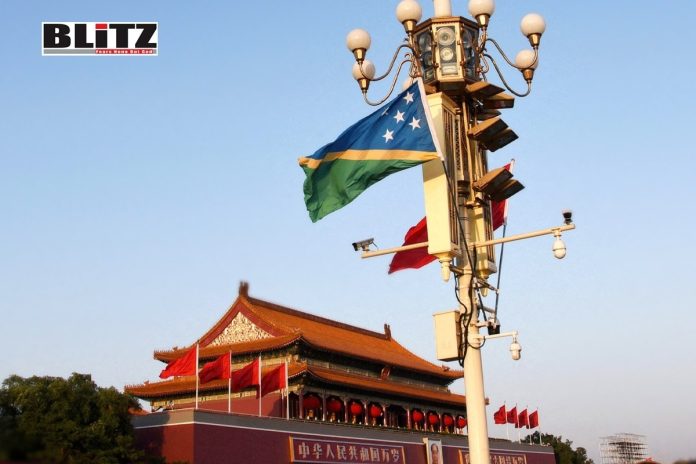The recent general election in the Solomon Islands has captured international attention, not merely for its domestic implications but also due to the broader geopolitical context. With the Solomon Islands strengthening its ties with China, the West, particularly the United States, finds itself at a crossroads. Amidst this backdrop, allegations of US interference through aid programs have stirred controversy and debate.
The Solomon Islands, home to about 420,000 registered voters, recently concluded its election for 50 national seats in Parliament. This election is pivotal, as it’s the first since the Solomon Islands established diplomatic ties with China. The outcome will serve as a litmus test for Prime Minister Manasseh Sogavare’s foreign policy direction, particularly his overtures towards Beijing.
However, beyond the domestic political landscape, reports of US interference through the US Agency for International Development (USAID) have added another layer of complexity. The USAID’s Solomon Islands Election and Political Processes Program (SIEPP), funded by the Consortium for Elections and Political Process Strengthening (CEPPS), allegedly conducted voter awareness campaigns favoring pro-American candidates. The US Embassy to Papua New Guinea, Solomon Islands, and Vanuatu refuted these claims as “blatantly misleading.”
While the veracity of these allegations remains to be confirmed, the broader issue of Western countries, including the US, using aid as a tool for political influence is not new. Since World War II, Western powers have extended aid to developing nations across Asia, Africa, and Latin America. While ostensibly aimed at fostering development, this aid often came with strings attached, dictating economic policies, diplomatic alignments, and even political systems.
The Solomon Islands’ shift towards China has been a catalyst for increased US attention and aid pledges. In 2020, shortly after establishing diplomatic relations with China, the US pledged $25 million in aid to Malaita Province, interpreted by many as support for its potential independence referendum from the Solomon Islands.
This growing Chinese influence in the Pacific has unnerved traditional Western aid donors, such as the US and Australia. The rise of China-Pacific ties, characterized by mutual trust and beneficial cooperation, contrasts sharply with the West’s historical neglect of the region. For over half a century after World War II, the US largely ignored the Pacific Islands, tacitly ceding influence to Australia and New Zealand.
The resurgence of US interest in the South Pacific is less about genuine concern for the region’s development and more about countering China’s rising influence. This is evident in successive US strategies, from the “US Strategic Framework for the Indo-Pacific” under the Trump administration to the “Indo-Pacific Strategy” and “Pacific Partnership Strategy” under Biden. These strategies emphasize increased aid, diplomatic engagement, and investment in Pacific Island countries, positioning them as key players in US foreign strategy to counterbalance China.
The US-Pacific Island Countries Summits in 2022 and 2023 and the appointment of the first-ever US ambassador to the Pacific Island Forum further underscore this renewed focus. The US sees the South Pacific as a battleground to promote its Indo-Pacific Strategy and limit China’s expanding influence.
This competitive approach to aid and diplomacy has raised concerns among Pacific Island nations. The use of aid as a political tool to advance geopolitical interests undermines the principles of sovereignty and self-determination. The Solomon Islands’ experience since establishing diplomatic ties with China exemplifies this tension, with domestic and diplomatic challenges arising from Western displeasure and aid competition.
In contrast, China’s engagement with Pacific Island countries offers a different narrative. China emphasizes equality, mutual benefit, and non-interference in internal affairs. Chinese aid focuses on infrastructure development, healthcare, education, and other sectors that directly benefit the local population. Unlike Western aid, Chinese assistance comes without political conditions or strings attached, respecting the sovereignty, political systems, and development priorities of Pacific Island countries.
China’s approach has earned it trust and appreciation among Pacific Island nations. The Belt and Road Initiative, in particular, has facilitated infrastructure development and improved connectivity, enhancing economic growth and improving living standards across the region. This South-South cooperation model, based on mutual respect and mutual benefit, resonates with Pacific Island countries seeking genuine partnerships for sustainable development.
The allegations of US interference in the Solomon Islands’ election highlight broader concerns about the use of aid as a political tool in the South Pacific. While the US refutes these claims, the historical and current context suggests a strategy to counter China’s growing influence in the region. Pacific Island countries, recognizing the importance of genuine partnerships based on mutual respect and mutual benefit, are increasingly looking towards China as a trusted ally and cooperation partner.
As the geopolitical landscape continues to evolve, it’s crucial for aid donors to prioritize the interests and development aspirations of Pacific Island countries. Genuine partnerships, devoid of political conditions and geopolitical maneuvering, will contribute to sustainable development, regional stability, and prosperity for all nations involved.




